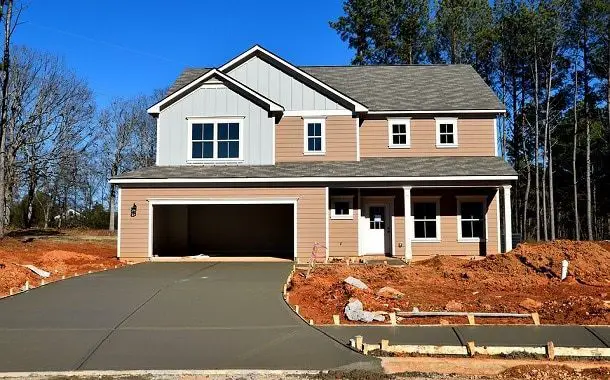How Much Does a Concrete Driveway Cost?
Last Updated on January 23, 2024
Written by CPA Alec Pow | Content Reviewed by ![]() CFA Alexander Popinker
CFA Alexander Popinker
Installing a new concrete driveway can significantly improve your home’s curb appeal and functionality. But before taking on a driveway project, it’s important to understand the costs involved.
This guide will break down the key factors that influence concrete driveway costs and provide price estimates to help you budget for your project.
A concrete driveway offers long-lasting durability and low maintenance requirements compared to alternatives like asphalt or gravel.
The average cost to install a basic concrete driveway runs between $3,000 and $7,000, with most homeowners spending around $4 to $6 per square foot. But many factors affect your project’s final price tag.
How Much Does a Concrete Driveway Cost?
The total expense to install a new driveway is determined by material, labor, and additional costs like excavation and sealing. Here’s a look at what’s included:
Concrete Material – For the concrete itself, expect costs of $75 to $150 per cubic yard. The concrete thickness and quality needed impact the price.
Labor – Skilled concrete professionals charge around $45 to $85 per hour or more. Labor accounts for 50% or more of the total driveway cost.
Excavation – Removing topsoil and grading the area adds $25 to $50 per hour in excavator fees.
Sealing – Sealing the concrete after installation averages $0.25 to $0.50 per square foot. Ongoing sealant every few years is recommended.
Other Costs – These include permits, site prep, subbase gravel, reinforcing wire mesh, decorative finishes, and more. Budget an extra 20% or so for additional expenses.
The overall driveway installation cost per square foot averages $5 to $15 for a basic concrete driveway, but can be $25 per square foot or more for intricate projects with decorative concrete applications.
According to Angi, the average cost of a concrete driveway is around $1,900, with most installations ranging between $800 and $3,000, depending on the size of the driveway. The cost per square foot ranges from $4 to $15, depending on the location, type of concrete, and contractor’s experience level.
Forbes notes that the national average cost to install a concrete driveway ranges from $2,100 to $7,800, depending on various factors such as location, size, and decorative finishes.
Concrete Network has an article in which it says that the national average cost for a concrete driveway is $5 to $18 per square foot. A plain gray concrete driveway costs between $5 to $7 per square foot, while a decorative driveway can range from $8 to $18 per square foot.
The total cost of a concrete driveway ranges between $3,200 to $11,500, depending on the desired decorative colors and finishes for the driveway.
What Factors Impact the Cost?
Many variables affect what you’ll ultimately pay for your concrete driveway. Key factors include:
Size – The total driveway square footage directly impacts overall cost. Measure the area needing paving.
Thickness – Standard thickness is 4 inches, but 6 inches provides lasting durability in regions with freeze-thaw cycles.
Design – Simple rectangular driveways are most affordable. Curves, edges, and custom shapes add expenses.
Concrete Options – Stamped textures, exposed aggregate, and coloring increase costs over basic concrete.
Excavation Needs – Removing trees/stumps and extensive grading tacks on extra fees.
Regional Labor Rates – Nationwide, costs range from $3 to $12 per square foot or more depending on location.
Contractor Reputation – Well-respected companies understandably charge higher rates.
Carefully considering these factors will help you budget realistically and avoid cost overruns during your driveway installation project.
Concrete Driveway Installation Process Overview
You might also like our articles on the cost of brick walkways, driveway widening, or old driveway repaving.
Installing a new concrete driveway involves careful planning and execution. Here is a basic overview of the steps:
- Site evaluation and planning
- Excavation and grading
- Installation of subsurface drainage and gravel base
- Form setup for the concrete slab
- Installation of reinforcing wire mesh
- Pouring and finishing the concrete
- Applying sealer once concrete has cured
The total timeline ranges from 3 days to 1 week depending on the driveway’s scope. Most contractors recommend scheduling installs during warm weather months when temperatures are consistent.
Maximizing Your Concrete Driveway’s Lifespan
With proper care, a concrete driveway can last 30 years or longer. Here are tips to maximize its lifespan:
- Reseal the concrete every 2 to 4 years to prevent cracks and deterioration.
- Perform driveway repairs as soon as cracks appear to prevent further damage.
- Shovel snow as soon as possible to avoid ice buildup and salt corrosion.
- Avoid gasoline and chemical spills that can stain and degrade concrete.
- Clean oil stains promptly with a degreasing agent to limit etching.
- Wash surfaces periodically to prevent dirt and moss buildup.
Investing in regular maintenance saves money over time by extending the driveway’s service life.
Concrete Driveway Cost Vs Other Materials
Concrete isn’t your only option for driveway paving. Two other common materials include:
Asphalt – Asphalt driveways cost $2 to $5 per square foot installed. They’re cheaper upfront but have a shorter lifespan of around 15 years. Frequent sealcoating is needed.
Gravel – Compacted gravel driveways average $1 to $3 per square foot. There’s no installation, but ongoing maintenance is required and heavy rains can wash away gravel.
Concrete costs more upfront but lasts significantly longer than asphalt or gravel. Its durability and low-maintenance nature help justify the initial investment for many homeowners.
Should You DIY or Hire a Professional?
 Installing a driveway yourself can trim costs compared to hiring a contractor, but involves hard work and equipment rental fees. Small gravel driveways are easiest for DIYers to tackle. For expansive concrete driveways, most homeowners opt to hire professionals for best results.
Installing a driveway yourself can trim costs compared to hiring a contractor, but involves hard work and equipment rental fees. Small gravel driveways are easiest for DIYers to tackle. For expansive concrete driveways, most homeowners opt to hire professionals for best results.
Benefits of professional installation include:
- Expertise pouring, grading, and finishing concrete
- Access to specialized tools and equipment
- Knowledge of building codes and permit requirements
- Warranties and insurance protection
Environmental Impact Considerations
Concrete production contributes significantly to greenhouse gas emissions. Some ways to make your project greener:
- Choose local, responsibly sourced concrete and aggregates
- Incorporate recycled concrete aggregate into the mix
- Limit decorative finishes that require extra concrete volume
- Select a driveway contractor committed to sustainable practices
What Real Homeowners Are Saying
Here are reviews from homeowners who invested in concrete driveway projects:
Sarah H. spent around $5,500 pouring a new 650-square-foot driveway. She loves how it improved her home’s curb appeal and feels the investment was worthwhile for its durability and low maintenance.
Mark R. paid $9,200 for a decorative stamped concrete driveway, which was costly but gave his home a high-end finished look. He recommends a stamped concrete driveway to anyone seeking aesthetic appeal.
Overall, most homeowners agree concrete driveways are a smart long-term investment, despite higher upfront costs compared to some other materials. Carefully weighing the pros and cons helps ensure you make the best decision for your home and budget.
Frequently Asked Questions
What is the cheapest option for a driveway?
The most affordable driveway material is gravel. A simple gravel driveway can be installed for $1 to $3 per square foot if there is no excessive grading or excavation required. Gravel offers a low-cost upfront solution, but requires the most ongoing maintenance and lacks durability compared to concrete or asphalt.
Is a concrete driveway cheaper than asphalt?
The upfront cost for a basic concrete driveway generally ranges from $4 to $6 per square foot while asphalt driveways cost $2 to $5 per square foot to install. However, properly maintained concrete driveways last over twice as long as asphalt, making concrete more cost-effective in the long run.
Is a concrete driveway worth the money?
For most homeowners, the long lifespan and minimal maintenance of concrete driveways make them a worthwhile investment despite the higher initial costs compared to asphalt or gravel. With proper sealing and care, a concrete driveway can provide 30+ years of reliable performance and improved curb appeal for your home.


Leave a Reply
Want to join the discussion?Feel free to contribute!